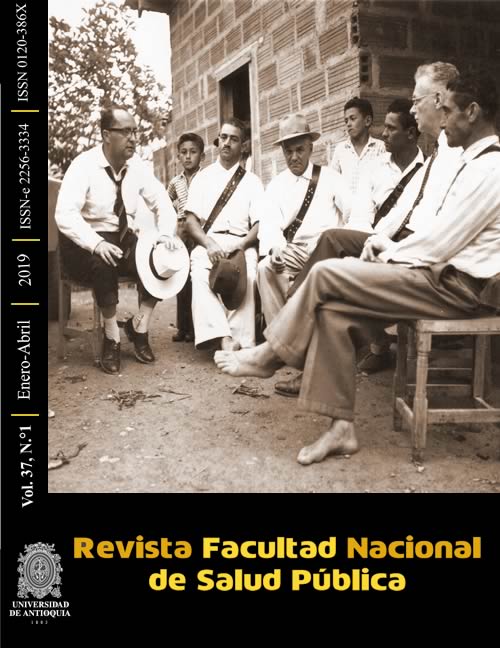Public Health, University and Power. The University that We Want
DOI:
https://doi.org/10.17533/udea.rfnsp.v37n1a03Keywords:
public health, higher education, power, neoliberalism, science, social medicine, critical epidemiologyAbstract
In line with the proposals made by Hector Abad Gomez, in this text, the authors question the role of higher education of our times, contributing elements to transcend from a domesticated functionalist public health. In here, we call for a university as a space of social self-awareness, in which intercultural thinking could be possible, constructed working close together with communities, and which may be able to produce a radical critique of a voracious market society. It draws the attention on the social determination of science and the critical moment that public health is currently facing, subordinated to a biomedical drug model and a predominant thinking of branches. To transcend from a hegemonic public health and construct a decolonized university obligates rethinking the way to construct the object of “Healthcare” and the way to think about it; it implies the development of a radical critical thought regarding the commodification of life, and the recovery of our own knowledge and wisdom. This is the challenge of collective Latin American Healthcare in the 21st century.
Downloads
References
(1). Gómez HA. Fundamentos éticos de la salud pública. 2.a ed. Medellín: Universidad de Antioquia, Corporación para la Educación y la Salud Pública Héctor Abad Gómez; 2012.
(2). Pasolini PP. Escritos corsarios. Madrid: Del Oriente y del Mediterraneo; 2009.
(3). Santos, B de S. Construyendo las epistemologías del sur: para un pensamiento alternativo de alternativas. Volumen 1. Ciudad Autónoma de Buenos Aires: clacso; 2018.
(4). Galeano E. Las venas abiertas de América Latina. Montevideo: Universidad de la República; 1971.
(5). Bourdieu P. O poder simbólico. Rio de Janeiro: Bertrand Brasil; 1998.
(6). Cohen B. La revolución newtoniana y la transformación de las ideas científicas. Madrid: Alianza Editorial; 1983.
(7). Waitzkin H. Medicine and Public Health at the End of Empire. Boulder, Colorado: Paradigm Publishers; 2011.
(8). Waitzkin H, y Working Group on Health Beyond Capitalism (Eds.). Health Care Under the Knife: Moving Beyond Capitalism for Our Health. New York: Monthly Review Press; 2018.
(9). Marmot M, Wilkinson R, editores. Social Determinants of Health. 2nd ed. Oxford: Oxford University Press; 2006.
(10). Foucault M. The subject and power. En: Dreyfus HL, Rabinow P, editores. Michel Foucault Beyond Structuralism and Hermeneutics. New York: Harvester Wheatsheaf; 1982. pp. 208-26.
(11). Jones R, Wilsdon J. The Biomedical Bubble. Why uk research and innovation needs a greater diversity of priorities, politics, places and people [internet]; 2018 [citado: 2018 ago. 24]. Disponible en: https://media.nesta.org.uk/documents/The_Biomedical_Bubble_v6.pdf
(12). Dussel E. Cómo derrotar el sucursalismo académico: tareas emancipadoras de la universidad en el siglo xxi. Quito: Universidad Andina Simón Bolívar, sede Ecuador; 2018.
(13). Virchow R. Report on the typhus epidemic in Upper Silesia 1848. Am J Public Heal. 2006;96(12):2102-5.
Downloads
Published
How to Cite
Issue
Section
License
The contents of the articles are the responsibility of the authors
The editorial committee has editorial independence from the National School of Public Health "Héctor Abad Gómez" of the University of Antioquia.
The editorial committee is not responsible for aspects related to copying, plagiarism or fraud that may appear in the articles published in it.
When you are going to reproduce and disclose photographs or personal data in printed or digital format, informed consent is required. Therefore, this requirement is required of the author at the time of receipt of the manuscript.
Authors are responsible for obtaining the necessary permissions to reproduce any material protected by reproduction rights.
The authors preserve the moral rights and assign the economic rights that will correspond to the University of Antioquia, to publish it, distribute electronic copies, include them in indexing services, directories or national and international databases in Open Access, under the Creative Commons Attribution license -Not Commercial-Share Equal 4.0 International Commercial (CC BY-NC-SA) which allows others to distribute, remix, retouch, and create from the work in a non-commercial way, as long as the respective credit and license are granted. new creations under the same conditions.
The authors will sign the declaration of transfer of economic rights to the University of Antioquia, after the acceptance of the manuscript.
The editorial committee reserves the right to reject the articles whose authors do not offer satisfactory explanations about the contribution of each author, to meet the criteria of authorship in the submission letter. All authors must meet the four criteria of authorship according to ICMJE: "a) .- That there is a substantial contribution to the conception or design of the article or to the acquisition, analysis or interpretation of the data. b) That they have participated in the design of the research work or in the critical review of its intellectual content. c) .- That has been intervened in the approval of the final version that will be published.d). That they have the capacity to respond to all aspects of the article in order to ensure that issues related to the accuracy or integrity of any part of the work are adequately investigated and resolved. "












 --
--  --
--
